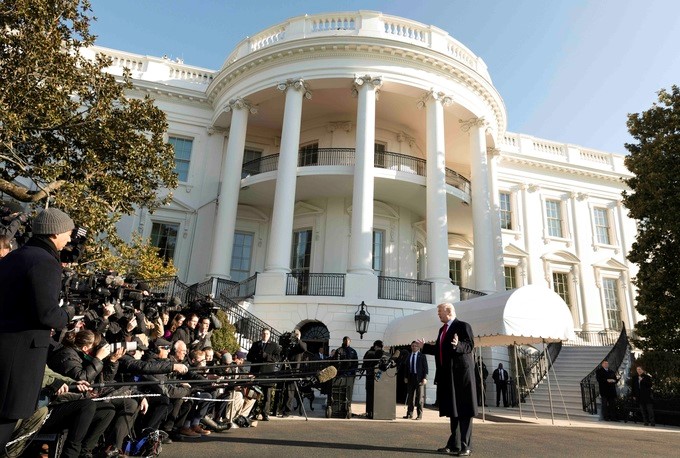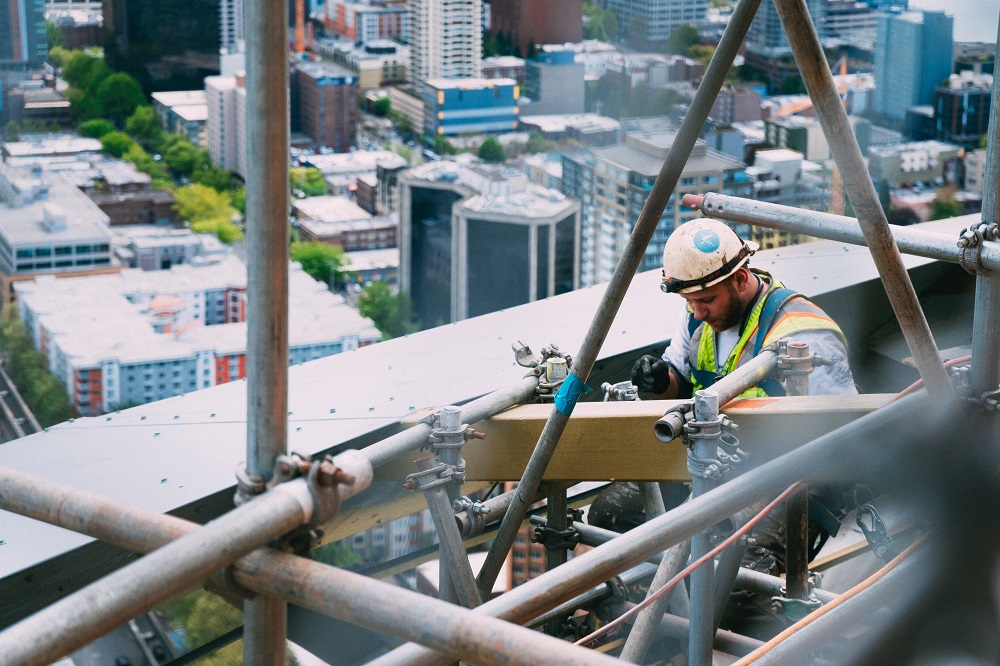U.S. Refugee Numbers Lower Than Ever
U.S. Refugee Program Cuts Leaves Asylum Seekers’ Fate Up in The Air
With more than 70 million people around the world being forced out of their homes due to violence and persecution, the number of refugees seeking asylum is at an all-time high. Meanwhile, United States President Donald Trump’s war on refugees and immigration rages on, creating a ripple effect being felt across the globe.
Once the world leader in refugee resettlement, for the past two years, the Trump administration has overseen the lowest refugee admission rates since the U.S. Refugee Admissions Program was created in 1980.
According to a recent article published by the Guardian, the U.S. has admitted just 14,808 refugees since October 2018. And despite the ceiling being set at 30,000 people, the country is forecasted to accept just 22,000 before the end of the fiscal year. Only 22,491 were admitted during the 2018 fiscal year.
The U.S. has traditionally welcomed the world’s most vulnerable refugees seeking asylum. In fact, during the final fiscal year of former president Barack Obama’s presidency, the U.S. took in about 85,000 refugees –more than four times than the Trump administration has let in.
However, attitudes towards immigration and refugees changed when President Trump took office and overhauled the country’s immigration system and refugee program. The controversial changes began with an executive order during his first week in office. Trump not only suspended refugee admissions, but blocked refugees from several predominantly Muslim countries and cut the admissions ceiling by more than half.
These changes resulted in refugee numbers plummeting to the point where resettlement centers have closed several offices across the nation. Allowing fewer refugees also means more families will remain separated due to the fact that one of the key roles of resettlement is family reunification.
Another outcome of Trump’s anti-immigration stance is the domino effect it has created in other parts of the world. The U.S.’ shrinking numbers have meant more countries are able to justify accepting fewer refugees. So much so that the number of resettlement places available has decreased by 54% since Trump was elected.
Canada, however, appears to be the exception to this concerning trend, as the country has remained consistent in its acceptance of newcomers, recently letting in the largest influx of immigrants in more than a century.
According to Statistics Canada, the country welcomed over 300,000 immigrants in 2018, which is the largest number since 1913. The same year, Canada resettled over 5,000 more refugees than the U.S.
By not following Canada’s lead, the number of refugees accepted into the U.S. is likely to dip even further, hindering tens of thousands of people from escaping refugee camps and reuniting with family members that have already been resettled.
Is Canada an Immigrant-Friendly Country?
Recent Polls, Comments Suggest Canada’s Welcoming Attitude Not So Warm
Is Canada truly an immigrant-friendly country? Recent polls and statements from politicians suggest otherwise.
Two recent polls, one from Leger, the other from Ipsos, suggest that previous polling data about Canada’s pro-immigrant attitude may not be quite so set in stone.
As reported by Global News, the Leger poll suggests a majority of Canadians believe the federal government should limit immigration numbers. 63 percent of the randomly selected 1,528 respondents, randomly selected from Leger’s online panel were in favour of limiting immigration.
Meanwhile, the Ipsos poll shows that nearly 50 percent of Canadians will admit to having racist thoughts, with more Canadians feeling comfortable expressing those thoughts than in past years. Again reported by Global News, the poll suggests a shocking amount of normalization of these behaviours, even as it finds that 1 in 4 Canadians have been victims of racism.
Muslims and Arabs are, according to this poll, the group most likely to be the targets or victims of racism.
The Ipsos poll also finds that 37 percent of Canadians feel immigration “threatens” white Canadians.
These findings are extremely concerning, to put it mildly.
Sean Simpson, vice-president of Ipsos Public Affairs, commented on the findings to Global News, saying that the “threat” could mean any number of common fears some Canadians may hold about immigration, adding, “For some people, it could mean an erosion of Canadian values—whatever those are.”
The concept of “Canadian values” being shared amongst all citizens is inherently flawed and seems predicated on outdated concepts about assimilating newcomers into some ill-defined concept of Canadian culture.
One of the perceived “threats” to white Canadians could be job loss, given the big focus on economic immigration. This theory does not stand up to scrutiny, given Canada’s labour shortage and the need for immigration to support economic growth.
Another could be the idea of the “criminal” immigrant or refugee—people who apparently “jump the queue” and get access to the country instead of a more deserving, “legitimate” immigrant, despite the fact that irregular border crossers are not jumping the queue or breaking the law. Conservative party leader Andrew Scheer stated, “There is absolutely nothing fair or compassionate about real victims of persecution having to fight the government to be reunited with their families, or forcing the oppressed to wait longer for Canada’s help while others jump the queue, exploit loopholes and cross the border illegally from places like upstate New York.”
Yet another “threat” is the so-called “replacement theory,” the idea that white majorities will be overcome by non-white people, leading to a clash between cultures. This theory is espoused by far-right politicians and white supremacists alike, not to mention leaders like Maxime Bernier of the People’s Party of Canada, who has spoken out against multiculturalism, commenting, “Our immigration policy should not aim to forcibly change the cultural character and social fabric of Canada, as radical proponents of multiculturalism want. Of course, society is transformed by immigration. But this has to be done organically and gradually.”
Immigrants and refugees are not stealing “Canadian” jobs. They work hard to make a living and establish lives for themselves and their families in Canada. Nor are immigrants and refugees criminals. They undergo extensive screenings and background checks, and they do not jump the queue by using a loophole in the Safe Third Country Agreement. Finally, immigrants and refugees are not replacing white Canadians; they come to Canada for the opportunities and freedoms offered, not to overthrow the majority population.
As a nation, we cannot allow ourselves to be divided by unfounded fears about newcomers to our country. We are a nation of immigrants, living on indigenous land, and we must never forget how our country was built: with helping hands from around the world and through acceptance of all cultures and values. Canadians stand for diversity and for protecting the most vulnerable individuals fleeing from persecution. We are a strong nation precisely because of our firm opposition to racism and divisive policies that are not based on facts and realities but misinformation and stereotypes. We are stronger together and must continue to stand united for human rights.
Quebec Immigration Bill Stirs Controversy
Quebec Immigration Changes Scraps Thousands of Immigrant Applications
While Canada has earned a reputation for welcoming newcomers with open arms, the Province of Quebec is pushing back with its own new rules on immigration, leaving the fates of tens of thousands of immigrants hanging in the balance.
The Quebec National Assembly recently passed Bill 9, which grants the provincial government increased authority over who receives permanent residency in Quebec, and the ability to launch a new immigrant selection system called Arrima. The government is also working on setting up an online portal to connect employers with potential workers by February 2020.
While Arrima is said to reduce applicants' waiting time, implementing this new system will allow the province to cancel immigration applications that were already in process from around 18,000 skilled workers, forcing them to start the process all over again.
Including the applicants’ families, it’s estimated that the new measures will impact around 50,000 people looking to immigrate to Quebec.
The new legislation also outlines the framework for a "values test" that applicants would have to pass in order to become a permanent resident. The test has yet-to-be-determined as it requires approval from the federal government before it can be imposed.
According to CBC, Quebec Immigration Minister Simon Jolin-Barrette claimed the intention of the legislation was to change "the immigration system in the public interest, because we have to make sure that we have an immigration tied to the needs of the labour market.”
Premier Francois Legault also defended the bill, insisting that the new measures will help fulfill the needs of Quebec’s job market.
Opposition parties, on the other hand, have denounced the ruling Coalition Avenir Quebec Party, describing the measure as “extreme and undemocratic.”
In comparison to the rest of Canada, the province of Quebec has additional powers when it comes to immigration, characterized by the federal government as a “special agreement.”
This allows the province to carry out its own screening process using criteria like French fluency to select immigrants it feels will adapt well to living in Quebec.
Once chosen, applicants are able to apply for permanent residency with the federal government. Some exceptions are in place for refugees, along with family members of Canadian citizens.
Besides the new immigration legislation, Quebec has also come under fire over the controversial Bill 21, commonly known as the ‘niqab ban.’ The recently passed secularism legislation makes it illegal for any public servants to wear religious symbols such as the hijab or niqab on the job. The provincial government will enforce the ban through surveillance and disciplinary mechanisms, which has been labelled by opponents as a secularism police force.
Canada Launches New Caregiver Immigration Pilot Programs
Revamped Programs Make it Easier for Caregivers to Find Safe and Secure Work
It may become easier for foreign caregivers to come to Canada and find meaningful, safe, and secure work that leads to permanent residency, thanks to two new pilot programs.
These programs, the Home Child Care Provider Pilot and the Home Support Worker Pilot, are 5-year pilot programs designed to help qualified caregivers come to Canada. The end goal is permanent residency and eventually, citizenship. Both programs launched on June 18, 2019.
A core component of these programs is making it easier for caregivers in abusive workplaces to leave and find a new employer, as work permits are no longer tied to the family bringing them to Canada. What’s more, qualified caregivers can now bring their families with them to Canada through work and study permits.
This benefit was once only available to highly skilled migrant workers. According to a statement given by Immigration Minister Ahmed Hussen to the Toronto Star, “Canada is caring for our caregivers … We made a commitment to improve the lives of caregivers and their families who come from around the world for our loved ones and with these new pilots, we are doing exactly that.”
Back in 2018, criticism of restrictions on the existing caregiver immigration programs triggered an extensive consultation and review process. Many argued that tying a work permit to a specific employer left caregivers highly vulnerable to exploitation.
As such, Canada’s immigration department has revamped and revised the programs.
Significant changes to the programs include occupation-specific, not employer-specific, work permits and the option for the caregiver’s immediate family to use work or study permits. Also, employers benefit directly since Labour Market Impact Assessments are no longer necessary before hiring an overseas caregiver.
Applicants must have a total of 24 months of full-time Canadian work experience in the 36 months before they apply to these programs. These pilot programs have a maximum of 2,750 applicants each annually.
These changes follow previous announcements that migrant workers in abusive job situations are eligible to apply for an open work permit from June 4 onwards. Also, starting July 26, 2019 newcomers suffering from family violence will be eligible for legal immigration status, including a work permit and healthcare coverage via a fee-exempt temporary resident permit application.
It’s reassuring to see Canada take such a strong stance on protecting migrant caregivers and workers.
Canada Taking Action to Help Vulnerable Workers
IRCC’s Recent Update Aims to Protect Newcomers
In a May 31, 2019 news release, Immigration, Refugees and Citizenship Canada announced the government is taking action to reunite families and protect individuals from abuse and violence. These efforts are meant to help vulnerable newcomers, workers, and families arriving from conflict areas around the globe.
This announcement is a response to cases where migrant employees experience abusive work environments, if not outright mistreatment while working under employer-specific work permits.
In such cases, migrant workers are left fearful of workplace abuse, punishment, and termination of employment, thus amplifying fears of jeopardizing their immigration status.
The government stated it firmly believes every worker in Canada is not only entitled to a healthy and safe work environment but that their rights must be respected.
– The Honourable Ahmed Hussen, Minister of Immigration, Refugees and Citizenship
Starting June 4, 2019, employer-specific work permits held by migrant workers who are in abusive job situations here in Canada are eligible to apply for an open work permit. Acquiring this type of permit will empower workers to leave abusive work environments while maintaining their status to find another suitable job.
As of July 26, 2019, migrant workers who suffer from family violence will also be eligible for legal immigration status in Canada that includes a work permit and healthcare coverage by applying for a fee-exempt temporary resident permit.
Furthermore, Canada is fast-tracking critical permanent residency applications on humanitarian and compassionate grounds for those suffering from violent family situations. However, this is only available for victims of family violence who are foreign nationals in Canada who have yet to obtain their permanent residence status and whose status in Canada is dependent on their abusive partner or spouse.
Finally, by September 9, 2019, the government will launch a pilot project lasting two years, allowing an individual who immigrated to Canada the ability to sponsor undeclared immediate family members. These sponsors must either be resettled refugees, conferred refugee protection in Canada, or were sponsored as a partner, spouse or dependent child.





